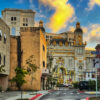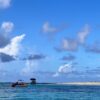WE like to think that the right thing to do and the legal thing to do are one in the same, and most of the time that is true. After all, when laws are passed, great consideration is given to whether the idea is in harmony with the general values and principles of the community.
But sometimes, circumstances create the opposite. Think of a soldier who disobeys orders to save his comrades, or the man who breaks the speed limit to get is injured wife to the hospital. And what of the parent who steals food in order to feed his children?
Father Choblet faced such a situation. He served as a missionary in the Pacific at a time when white people were scarce in these parts. In fact, outside of priests and the occasional whaling ship, most islanders never saw outsiders. As representatives of their race, therefore, the white missionaries carried a heavy burden, for their behavior was seen as typical. What they said and did must be the way of all white people. If they were righteous and wise, the whites must be, and if they be scoundrels, the rest of the whites must be that as well. The missionaries were very aware of the way in which they carried the mantle for their entire race and walked a careful line because of it.
One day, Father Choblet received word that a fellow priest, Father Franchiteau, serving a hundred miles away on another island, was dying. He sent word requesting Choblet come administer last rites, for he did not want to die improperly and face the wrath of his God. Choblet took this request as seriously as Franchiteau did since he did not want to shirk his duty and be held responsible by the Almighty. There was one catch. They were right in the middle of typhoon season and the government passed a law that forbade canoe travel between islands during the season. It was simply too dangerous to risk one hundred miles in a canoe at the moment. No vessel could withstand the strain if they should come upon a storm, and the chances were good that they would.
The islander men implored him not to go. It was dangerous and illegal. He told them not to worry, that he would go alone. He would face the wrath of nature and the civil authorities. It was the right thing to do. Of course, his friends would not let him travel alone, so three islanders climbed aboard the canoe with him. As they pushed off, they knew their chances were slim, and even if they returned, what legal implications awaited them?
The first eighty miles of ocean went well, but trouble brewed on the horizon. Though they paddled as fast as they could (they could not use sail, the wind blew in the wrong direction), the storm gathered even faster, their tempo was a losing cause. They were eight miles out from their destination when the storm gained the victory and snapped their canoe in half. The four desperate men clung to the wreck and wondered if they had breathed their last. But chance was on their side. There was a strong current that pushed them toward the island, and in fact, deposited them on the beach just a few miles from where the doomed priest lay dying. Choblet rushed to his side and administered last rites, and Father Frachiteau passed away from this world.
Every God-fearing man and woman in the islands hailed Choblet as a champion and a great man, but the law had something else to say about what he had done. There could be no doubt that Choblet and his friends were heroes, but they had clearly broken the law. What they did was the illegal thing, but the right thing.
The judge who presided over the case knew that the reputation of all white people, their legal system, their religion, and their respect hung in the balance. Although Choblet begged mercy for his three friends, arguing that he was the true criminal and they were only following his orders, the court would not be swayed. All four men were found guilty of breaking the law, and each of them was fined one dollar. After the ruling, in recognition of their self-sacrificing act on behalf of the dying priest, the judge awarded each man two dollars. They quickly paid the fine and pocketed the rest, sleeping well that night knowing that although they had done an illegal thing, they had done the right thing.
BC Cook, PhD lived on Saipan and has taught history for 20 years. He currently resides on the mainland U.S.

BC Cook










